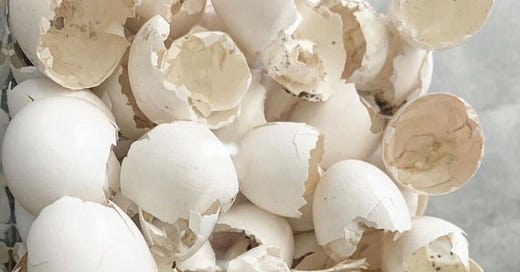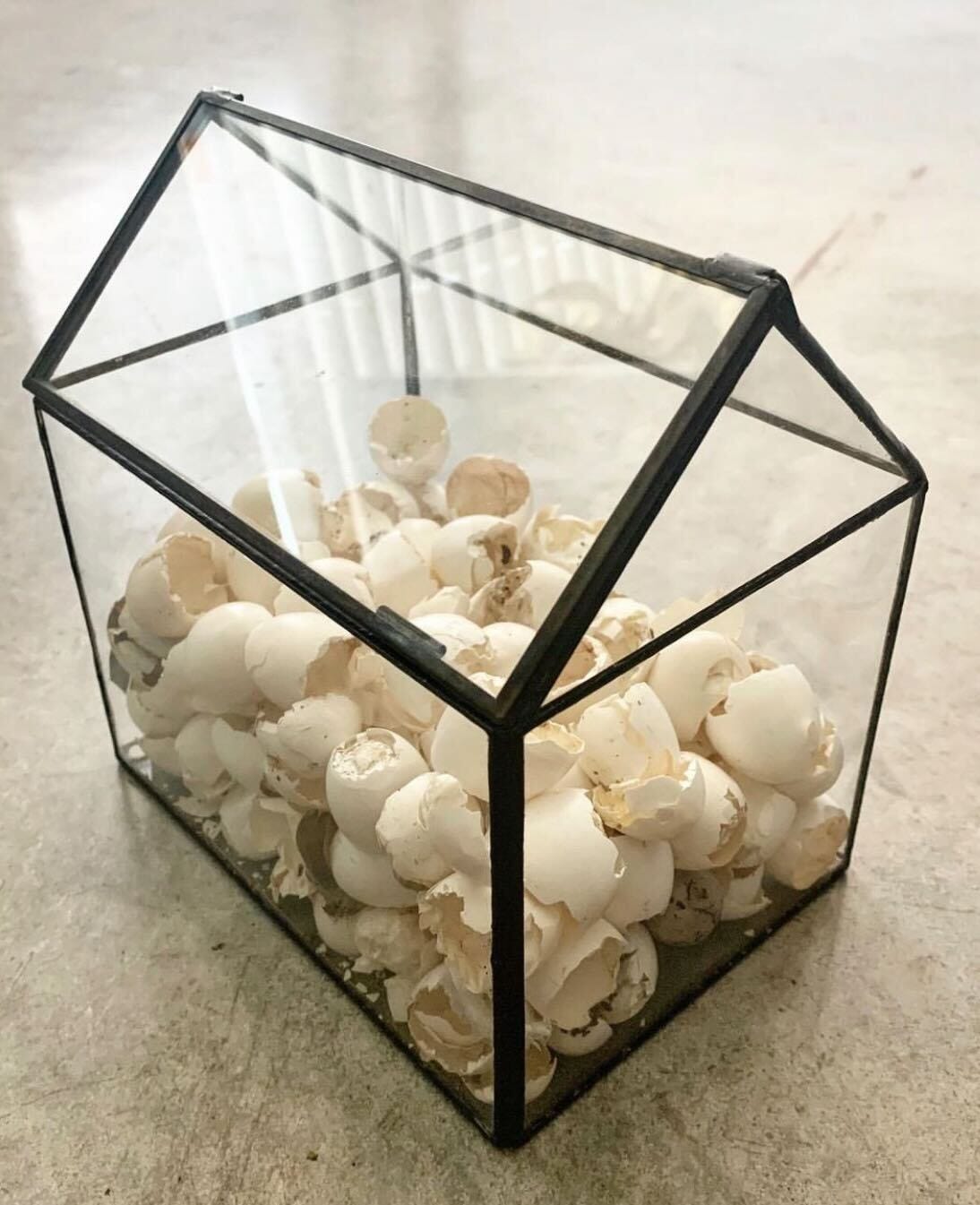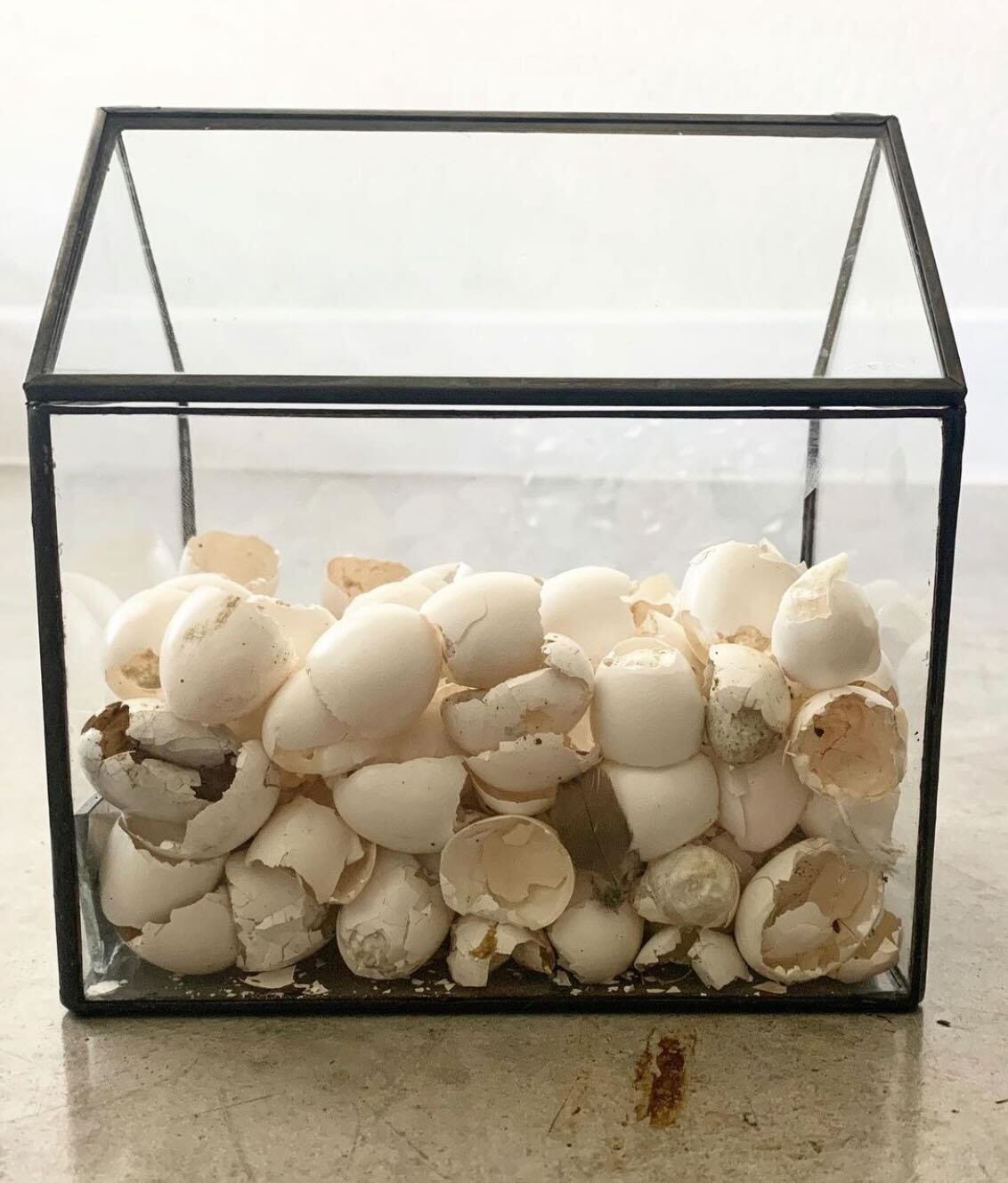The days start running together. Almost everything I own is in a cardboard box, except a few books, the most critical black dresses, and my father’s ashes. There is one other thing that isn’t in a box, which is a sculpture I made after my father died.
When my father died, I went home and planned his funeral in three days. I picked up his ashes, from the funeral parlor, alone. The funeral director walked me to the car in a light rain. He kept offering me his elbow but I didn’t want him to touch me. In the car, I sat with the weight of my dead father in my lap. He was in a white square that had a strange rattle to it, the rattle of bits of bone and teeth in the new powder of him. I was thinking then how when I was a child, he’d held me in his lap. This was the first and only time the positions would be reversed. When I drove home, in the light rain, I sobbed so hard I was sure I would crash the car.
After that, I kept going. I had a new job I’d just started, I was on book tour, there wasn’t time to stop. I fit my grief in around meetings, around readings and class visits, around writer-in-residence days at colleges. Sometimes, alone, I would howl in sorrow. My pain got so great that once my father came to me in a golden dream and made a joke, the type of joke only he could make, and I woke up laughing and sobbing at the same time.
I have known pain for my entire life. In fact, I thought I’d become an expert in loss: Heartbreak, physical pain, death, all of it. But when my father died, I was almost in awe at the amount of pain, a type of pain as blistering as a newly discovered sun, a new level of pain no one had warned me about. I suddenly understood my friends who had already lost parents, the way they seemed to be in some sort of secret club.
At some point, after work one night, after the sun had set in Austin, one of those spectacular sunsets, I found myself standing on the bridge over Lady Bird Lake. In the darkness, the city glittering and reflecting itself in the water, I had the forbidden thought. I have a deal with my little brother — we have to call each other if either one of us wants to do something stupid. It was a promise we made as gallows humor, but I picked up the phone. After an hour, I walked off the bridge. The next day, I went to the doctor and got help.
Then COVID hit, and we were in lockdown. I was stuck with my grief. I couldn’t avoid it. I was in a room with it, I had to stare at it, I had to take it apart and understand it. Some days, it was unbearable to withstand it. Other days, it retreated and I could breathe. Even medicated, the loss was harrowing to live with — a permanent arrow lodged in my heart that I had to live around, shifting my body in agony every moment.
Every day, I took walks. I didn’t know what else to do. On the walks, I noticed egg shells, white ones, delicate and perfectly cracked, littering the ground. Mourning doves were nesting and it was their season to hatch.
A strange compulsion overtook me, one I’m not sure I understand even now. I began to secretly collect the eggshells. I’d carry them home in my palm. It required delicacy and patience: If I grasped them too tightly, they would shatter. If I walked too fast, they could collapse in my hand. There was something to it, the delicacy of life.
If you asked me now why I was doing it, I couldn’t tell you — I was grief-stricken, maddened, unhinged, carrying eggshells in my hands. I didn’t even like birds.
At home, I filled a bowl with them, gently, slowly, so they wouldn’t crack. This went on for months, the task of finding them and saving them. I became an expert at looking. My eyes were already on the ground in sorrow, and now I had a mission.
If one wanted to draw a parallel between the white of my new anti-depressants and the white of the eggshells, one could do so poetically. One could maybe put it in MOMA.
The mourning doves were thin and gray with wise eyes. They had a beautiful coo. During the pandemic, they overtook the trees in Austin, cooing constantly. It was a sweet sound, as if the birds were trying to comfort themselves and everyone or else trying to entertain a newborn baby.
I didn’t tell anyone what I was doing. But soon, there was a bowl of mourning dove eggshells in my apartment and I wasn’t sure what to do with them. I found myself in a predicament: I’d spent so much time and energy collecting these delicate objects, and I couldn’t just throw them away.
At the time, I was seeing a brilliant artist who was adept at sculpture, but I was too intimidated to talk to him about what I was up to. Sculpture was his, writing was mine. After some research, I came up with a way to preserve the eggshells through a curing process which would harden them. So I did — one by one, I cured the eggshells.
I placed them in a small glass house so I could see inside. The eggshells layer on top of each other, a delicate fortress that would collapse beneath a fist. I wasn’t sure why I had done any of this, but by the end, there was no difference between the sculpture and the inside of my heart — fragile, jagged, beautiful, temporary.
I’m writing about it now because I’m not sure how to pack it, the sculpture.
It sits next to my father’s ashes, two objects I’m not sure how to move but which have to come with me. It is an impossible task, to carry the memory and the grief. It is like carrying palmfuls of eggshells across the country. I’m not sure how to carry either of them, but I cannot leave them behind.
What I have of my father is not all of him. We have split him up into thirds. His ashes and the eggshells are both pale and almost weightless to the touch if you take them out of their boxes. You have to be careful. Anything could destroy them. If you hold them too tightly, they’ll dissolve in your palm.







Hi Sara, beautiful piece. Sorry to hear about losing your dad; it is a terrible secret club. Keep making art and good luck with the move.
So tenderly and beautifully said. And the three different perspectives in the photos add a dimension to the essay, a sense of looking at the house of shells as if on display in a museum or in a mirror or both at the same time.